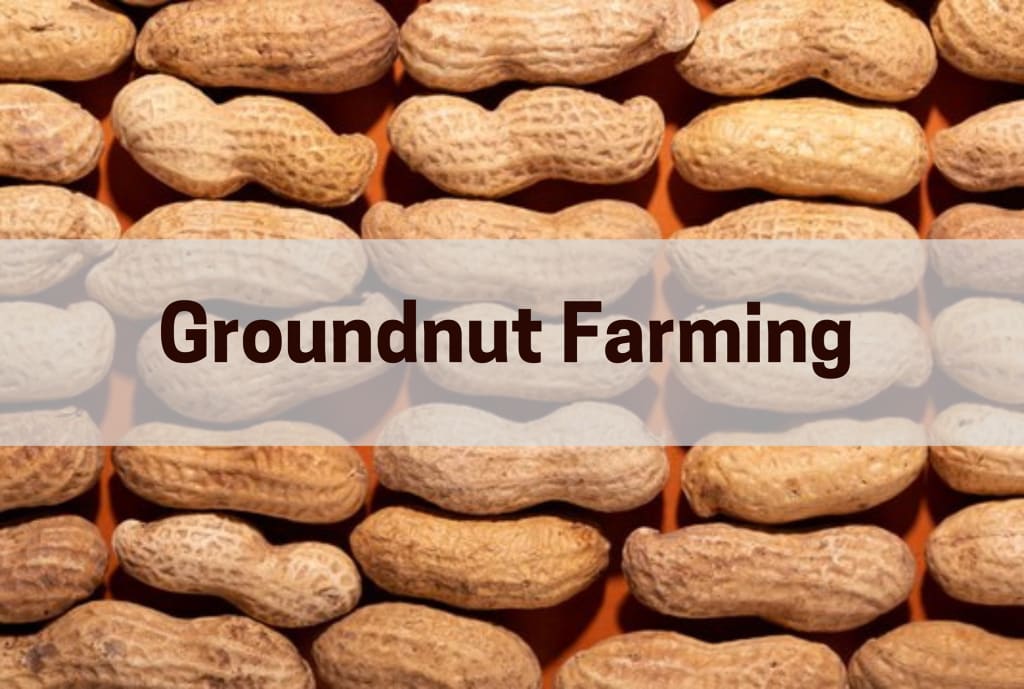Groundnut Farming Guide in India
Groundnut farming, also known as Peanut Farming

Groundnut farming, also known as Peanut Farming, is very popular in the Asia region.
Peanuts are also a significant part of the Indian agricultural economy. They are a major food crop and a highly demanded oil. Their financial significance extends to groundnut producers and grain traders.
"Arachis hypogaea" is the scientific name of peanut. Ground nuts, earth nuts, monkey nuts, pygmy nuts, pig nuts and goober peas are among some of its popular names. Groundnuts belong to the family Fabaceae and genus Arachis, for which it is an annual herbaceous plant. Its growth can take place in tropical as well as subtropical conditions, and it can reach a height of 50cm. They have a sweet taste, crispy texture, deep nutty taste and long life span.
Top Groundnut Producing States in India:
India is one of the major groundnut-growing countries globally. Moreover, China ranks first, followed by India as the second-largest global producer of peanuts.
The key states that make India one of the leading producers of peanuts are Gujarat, Andhra Pradesh, Tamil Nadu, Karnataka, Maharashtra, Madhya Pradesh, Punjab, Odisha, Uttar Pradesh, and Rajasthan. Gujarat produces around 46.68 per cent of peanuts, while Rajasthan contributes 16.27%, Tamil Nadu 10.38%, and Andhra Pradesh 8.53%.
Benefits of Eating Peanuts:
Here are the benefits of eating peanuts daily-
- Rich source of protein
- Helps in losing weight
- Makes bones strong
- Healthy Skin
- Improves eyesight
- Can reduce the risk of cancer
- Keeps your heart healthy.
- Reduces risk of Diabetes
Groundnut Farming Cultivation Process:
Groundnut farming involves various processes, including weather requirements for plantation, soil requirements, soil preparation, and pest-disease management. Irrigation methods are also important aspects of the groundnut cultivation process.
Weather Requirements for Groundnut Plantation:
Rainfall and temperature are two major climate factors that affect peanut crop growth. Warm and humid weather conditions are best for strong peanut growth, as cool or damp weather will cause slow germination and seedling. It can also rot the seed. Peanut crops are not resistant to long frosts, extreme drought conditions, or waterlogged soil.
The perfect temperature for peanut farming is between 68 to 95 °F (20 to 35 ℃). To grow peanuts properly in cold weather, it is necessary to put more insulation or heat the environment.
There should be enough rain during the flowering pegging and pod development to produce a good crop and high-quality peanuts. Peanuts should be grown where rainfall amounts to 600-1,500 mm, but 1,250 mm is best.
Soil Requirement For Groundnut:
The soil pH should be maintained within the 5.5 to 7.0 range. Saline soils are unsuitable for groundnut cultivation due to their low salt tolerance. The soil should be rich in calcium and contain a reasonable amount of organic matter.

Soil Preparation:
Those who want to grow groundnuts can follow these steps when preparing the soil for this crop.
- First, check the soil quality and pH levels.
- Mix the organic matter into the soil to enhance fertility and ensure optimal nutrient availability.
- Now, use proper tillage techniques to get a well-aerated, loose soil structure.
- Remove debris and check drainage to promote a perfect environment for peanut farming.
Farmers can use heavy-duty tractor like Farmtrac 6055 to plough the land for groundnuts. This tractor is fuel efficient and performs well in different soils and weather conditions. The Farmtrac 6055 price is highly affordable. It is designed to meet various requirements of modern agriculture.
Pest and Disease Control in Groundnut Cultivation:
Aphids, thrips, and termites are some of the pests that damage plant leaves and pods. Also, one of the most common diseases in peanuts is Leaf spot. Fungi cause this disease. It can cause defoliation and reduced photosynthesis in the plant, which will decrease its development and output.
Diseases such as rust and leaf spot also damage groundnut crops. Proper irrigation techniques, crop rotation, and the use of disease-resistant groundnut varieties can help in avoiding the spread of these diseases.
Irrigation Methods:
Farmers use Irrigation techniques in groundnut farming to keep the soil surface moist without water logging problems. When they grow this crop in rainy regions, a proper drainage system is important so that water doesn't stay in the field. Also, if the crop needs extra irrigation, producers should do it during the flowering, pegging, and seed development stages.
Producers should depend on irrigation while cultivating groundnuts as rabi or summer crops. This crop needs about 600–650 mm of water in total. Reduced irrigation is advised when crops are almost mature and fully grown to avoid disease outbreaks. Farmers should use sprinkler irrigation instead of flood irrigation for peanut plants.
Conclusion:
As peanut farming is highly profitable, anyone who is planning to grow peanuts can do it by keeping various requirements of this crop in mind. This crop guarantees optimal yield. Also,It plays a vital role in food security, nutrition and economic development, giving a source of income to millions of farmers all over the world.
About the Creator
Rajendra_Singh
I'm a agriculture blogger, who loves sharing my knowledge about growing things. On my blog, you'll find practical tips and interesting stories to help you get started!
Enjoyed the story? Support the Creator.
Subscribe for free to receive all their stories in your feed. You could also pledge your support or give them a one-off tip, letting them know you appreciate their work.






Comments
There are no comments for this story
Be the first to respond and start the conversation.